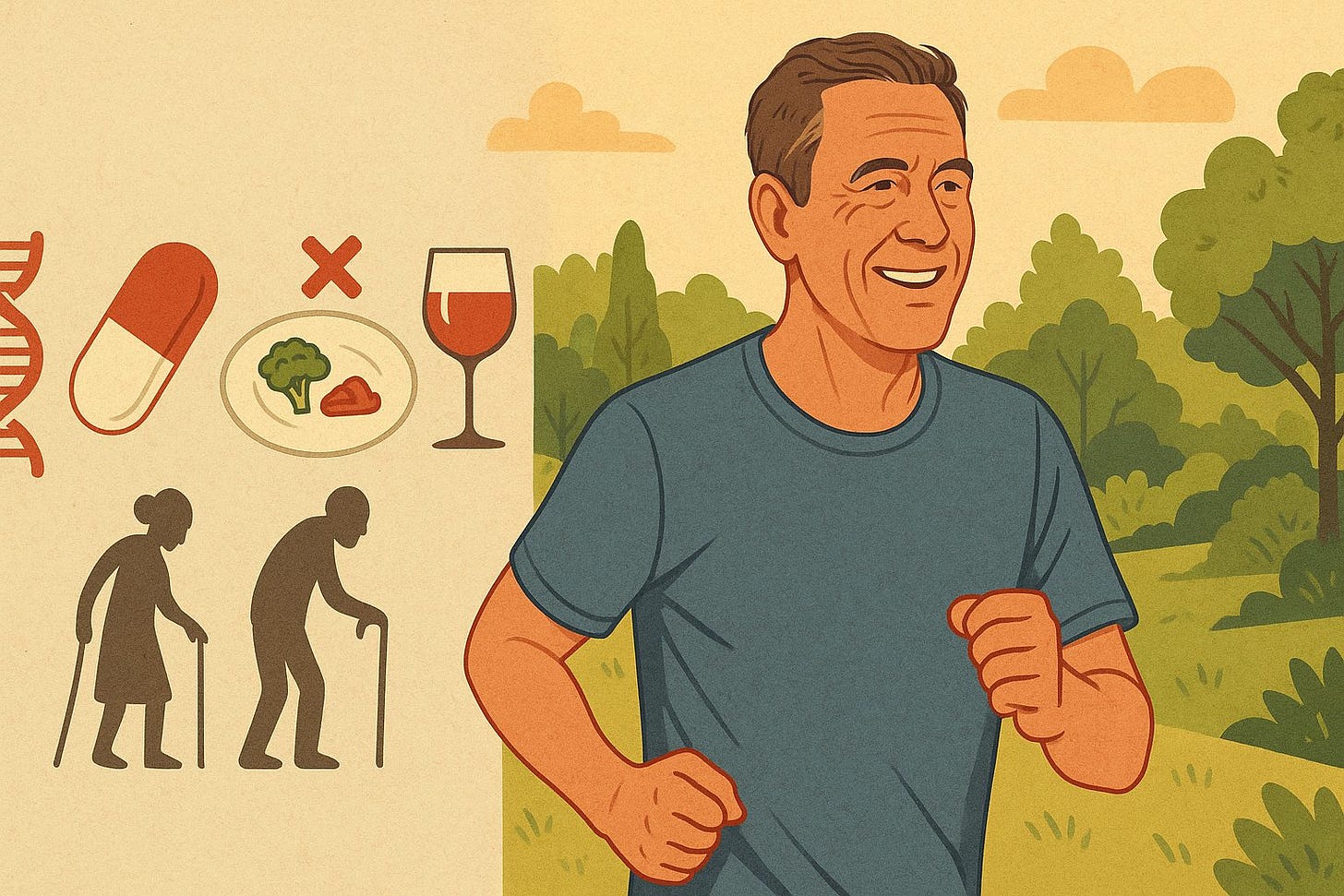7 Longevity Myths That Are Holding You Back (Debunked by Experts)
It's not about secret pills or blue‑zone scams—it’s time to rethink what really makes you live longer.
Ever felt that sly frustration staring back at you in the mirror—someone who wants more years, more vibrancy, more oomph? Well, you're not alone. The longevity industry is booming—valued at around $19 billion and projected to more than triple by 2035—but is all that shiny promise actually paying off, or is it just gloss? 🤔 I think it's time we sift fact from fiction and bust the myths that keep us trapped in the endless chase. Ready? Let's dive in.
1. "Genetics is destiny—your lifespan is fixed."
A half‑truth that cripples action.
Yes, genes are part of the equation—but they only account for about 20% of lifespan. The rest—80%—lies in your hands: diet, exercise, stress, sleep, environment.
👉 Takeaway: Your DNA doesn't own the mortgage on your life. Lifestyle improvements do.
2. "There's an anti‑aging silver bullet (rapamycin, resveratrol, Urolithin A…)."
The quest for a magic pill is alluring.
Some substances show promise—e.g., rapamycin in animal models—but human data is still inconclusive. No supplement, vitamin, or molecule stops time.
💡 Smart play: Instead of chasing hype, invest in proven fundamentals—nutrient-rich meals and daily movement.
3. "Calorie‑cutting = longer life."
Extreme calorie restriction isn't the answer—evidence is murky in humans. Forcing yourself into deprivation often backfires—fatigue, nutrient loss, mental strain.
✅ Better approach: Focus on nutrient-dense whole foods. Moderate portions beat starvation every time.
4. "Red wine daily equals a longer life."
The resveratrol myth got its PR from a cork, but that glass doesn't deliver miracles.
Even dedicated studies admit resveratrol levels in wine are too low to count; meanwhile alcohol increases cancer risks.
If you enjoy one glass, go ahead—but don't think it outweighs veggies, sleep, or a workout.
5. "More exercise = infinitely more life."
More is not always merrier.
Yes, regular moderate physical activity extends lifespan (e.g., 4.5 extra years from leisure exercise). But overtraining? Burnout, injury, stress—not so much zen. Experts recommend a balanced mix of cardio and strength time—you actually enjoy.
6. "Centenarians know the secret."
Let's be blunt: centenarians had luck and genetics. Advice like "eat like them" can mislead.
In fact, longevity scientists stress that centenarians are statistical outliers (survivorship bias)—not lifestyle gurus. Instead, actionable longevity habits—exercise, not smoking, Mediterranean-style diets—can add up to 14 years.
7. "Blue Zones are your playbook for immortality."
The romantic idea: follow Mediterranean, Okinawa, Sardinia lifestyles and you'll be unstoppable.
But recent research shows that Blue Zone age claims may be inflated—some due to poor record‑keeping and even pension fraud. That doesn't mean their habits are useless—just that longevity isn't guaranteed because they hit 100.
💡 Wisdom to keep: Plant-forward diets, social connection, movement and purpose are helpful—especially when paired with good data.
Also read: 5 Powerful Ways to Extend Healthspan, Not Just Lifespan
Final Take & Call‑to‑Action
Let's face it: there's no cloak of invisibility or fountain of youth. Instead, longevity is the art of stacking evidence-backed habits daily:
🏃♂️ Get moving (150 min/week of moderate exercise + strength).
🥗 Eat whole foods—rich in plants, lean proteins, healthy fats.
😴 Sleep well & manage stress.
🚭 Ditch smoking, keep alcohol moderate.
🧠 Stay mentally sharp and socially engaged.
And maybe save your money—don't spend thousands on genomic scans or longevity "membership" programs with zero proof.
Now I ask you: which myth made you nod knowingly—or roll your eyes? Drop a comment or share on social! Want me to unpack any of these? I'm here for you 👇


